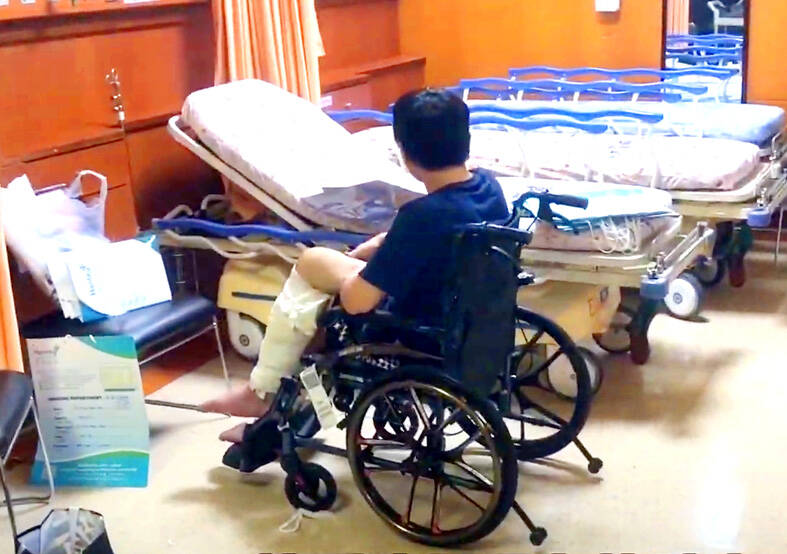The Global Anti-Scam Organization (GASO) is urging people to be alert when in Southeast Asia after a Taiwanese tourist was drugged and kidnapped by cyberscam criminals.
A Taiwanese in his 20s was seriously injured after falling out of a building while fleeing his kidnappers, GASO said on Friday.
In a video recording for GASO, the man said he was traveling alone in Chiang Mai, Thailand, and went to a bar, but could not remember what happened next, adding that someone must have spiked his drink.

Photo courtesy of Global Anti-Scam Organization
He said that when he woke up, he was in a car heading to Kokang region in Myanmar’s Shan State, which is across the border from Chiang Mai.
The men escorting him wore military uniforms and carried firearms, he said.
He said he was taken to a guarded compound in Kokang, which borders China’s Yunnan Province, and was held captive by cyberscam operators.
For one month he was trained in investment fraud, learning to talk like a businessman to entice people with promises of making money, he said.
The dozens of captives got a chance to escape when their supervisor went out one day. They broke open a ventilation duct, then tied bedsheets together to form a rope and threw it out of a window on the seventh floor, he said.
The man said he went first, but could not hold on and fell about five stories, but his fellow captives fled the compound with him and took him for treatment.
He had broken both legs and fractured vertebrae in several places, among other injuries.
He said he bribed the security guard at the hospital managed to telephone his mother in Taiwan, who then contacted the GASO.
Local media reported on his case, and some Taiwanese businesspeople in Myanmar helped him.
The man said he had to pay NT$300,000 (US$9,435) in total to get home, and his medical expenses came to NT$200,000.
He said when people are kidnapped by cybercrime gangs, they have to work as instructed or be sold for NT$300,000 to NT$500,000 to other gangs, which might demand a ransom for them, or for organ harvesting.
“I was not beaten up, because I cooperated with them and did what I was told,” he said. “Do not go to Thailand alone, you must go with friends.”
GASO and international authorities have reported that Phnom Penh, and Kokang and Myawaddy in Myanmar are among the main centers for cyberscams, which are mainly run by Chinese gangs.
A GASO spokeman surnamed Chen (陳) said cyberscam gangs have moved their operations from Cambodia and Myawaddy, to Kokang, and adjacent regions on northern Thailand and Myanmar, where they are “a law unto themselves.”

Taiwan is stepping up plans to create self-sufficient supply chains for combat drones and increase foreign orders from the US to counter China’s numerical superiority, a defense official said on Saturday. Commenting on condition of anonymity, the official said the nation’s armed forces are in agreement with US Admiral Samuel Paparo’s assessment that Taiwan’s military must be prepared to turn the nation’s waters into a “hellscape” for the Chinese People’s Liberation Army (PLA). Paparo, the commander of the US Indo-Pacific Command, reiterated the concept during a Congressional hearing in Washington on Wednesday. He first coined the term in a security conference last

Prosecutors today declined to say who was questioned regarding alleged forgery on petitions to recall Democratic Progressive Party (DPP) legislators, after Chinese-language media earlier reported that members of the Chinese Nationalist Party (KMT) Youth League were brought in for questioning. The Ministry of Justice Investigation Bureau confirmed that two people had been questioned, but did not disclose any further information about the ongoing investigation. KMT Youth League members Lee Hsiao-liang (李孝亮) and Liu Szu-yin (劉思吟) — who are leading the effort to recall DPP caucus chief executive Rosalia Wu (吳思瑤) and Legislator Wu Pei-yi (吳沛憶) — both posted on Facebook saying: “I

The Ministry of Economic Affairs has fined Taobao NT$1.2 million (US$36,912) for advertisements that exceed its approved business scope, requiring the Chinese e-commerce platform to make corrections in the first half of this year or its license may be revoked. Lawmakers have called for stricter enforcement of Chinese e-commerce platforms and measures to prevent China from laundering its goods through Taiwan in response to US President Donald Trump’s heavy tariffs on China. The Legislative Yuan’s Finance Committee met today to discuss policies to prevent China from dumping goods in Taiwan, inviting government agencies to report. Democratic Progressive Party Legislator Kuo Kuo-wen (郭國文) said

The Ministry of Economic Affairs has fined Taobao NT$1.2 million (US$36,900) for advertisements that exceeded its approved business scope and ordered the Chinese e-commerce platform to make corrections in the first half of this year or its license would be revoked. Lawmakers have called for stricter supervision of Chinese e-commerce platforms and more stringent measures to prevent China from laundering its goods through Taiwan as US President Donald Trump’s administration cracks down on origin laundering. The legislature’s Finance Committee yesterday met to discuss policies to prevent China from dumping goods in Taiwan, inviting government agencies to report on the matter. Democratic Progressive Party